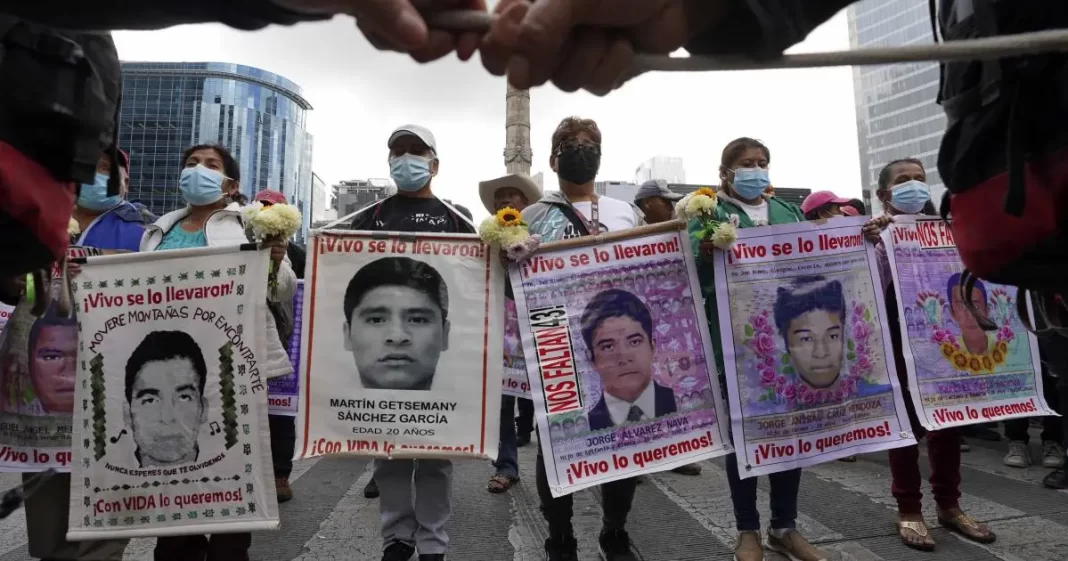Today, the families of the 43 Ayotzinapa students mark 10 years of tirelessly searching for their loved ones. Since September 26, 2014, when security forces colluding with a criminal group forcibly disappeared the 43 students and committed other serious human rights violations, the families, along with the organizations accompanying them, have demanded answers from successive governments.
They have conducted searches, pushed for the creation of new investigative mechanisms, and turned to international bodies, ceaselessly denouncing this paradigmatic case within the context of a national disappearance crisis that, as of 2022, has surpassed 100,000 disappeared persons in Mexico.
However, 10 years later, the families still lack access to truth and justice.
A decade ago, under then-president Enrique Peña Nieto, the government’s immediate reaction to the case was to try to construct a false “historical truth” in order to close the investigation. It would later be revealed that this version was fabricated through falsifications and acts of torture.
President Andrés Manuel López Obrador came to power in 2018 promising to advance access to the truth. He created an inter-institutional commission for the case, held meetings with the families, and invited the Interdisciplinary Group of Independent Experts (Grupo Interdisciplinario de Expertos y Expertas Independientes, GIEI) to return to Mexico. The GIEI, appointed by the Inter-American Commission on Human Rights (IACHR) to provide technical assistance in the case, had previously helped disprove the false “historical truth”. In addition, a Special Unit was created in the National Prosecutor’s Office (Fiscalía General de la República, FGR) to conduct the criminal investigation.
In the last two years, however, the progress made has suffered new setbacks and obstacles, including a growing discourse by the president of discrediting the families and their representatives, in particular the Miguel Agustín Pro Juárez Human Rights Center. These setbacks show the persistence, even in this high-profile case, of longstanding mechanisms of State opacity and lack of accountability.
The upcoming inauguration of President Claudia Sheinbaum on October 1 thus marks a decisive moment for the Ayotzinapa case and for the country’s disappearance crisis. The new president and her government have an obligation to take up the case and the crisis it represents, not only to search for and identify the direct victims, but to break the cycle of disappearances in Mexico.
Three key pending tasks in the case for the new federal government are:
Place all information held by the State at the service of uncovering the truth and determining the whereabouts of the students.
Over the last decade, the work of the organizations representing the families, the GIEI, the Special Unit, the Argentine Forensic Anthropology Team (Equipo Argentino de Antropología Forense, EAAF), and others has made it possible to reconstruct some of the facts of the case, revealing the involvement, through acts and omissions, of local, state, and federal authorities—military and civilian—before, during, and after the enforced disappearances. It has also been discovered that state institutions, particularly the Ministry of Defense (Secretaría de la Defensa Nacional, SEDENA), possess case information they have not yet shared, including hundreds of pages of documents containing data that could help point to the students’ whereabouts.
This is highly relevant, given that authorities have found no trace of the vast majority of the victims (only three of the students have been identified). It is vital that all documents and evidence possessed by the armed forces and any other institution be shared so that authorities can deploy all necessary actions in the search for the students and the truth.
This information is also relevant for the ongoing criminal investigation by the FGR. During the tenure of the case’s first Special Prosecutor, the investigation saw advances in the search for the students and the indictment of authorities who initially hindered the investigation. This stage of the investigation demonstrated that it is possible to investigate complex criminal networks that collude with authorities, making use of evidence, technology, and international cooperation (instead of fabricating false narratives under torture). The Special Unit obtained arrest warrants against civilian and military authorities. However, due to political interference, in 2022, the Special Prosecutor had to resign, and the investigation passed to an official questioned for lack of experience in investigating serious human rights violations. The extent to which effective steps are taken to overcome current obstacles and advance criminal investigation, including by prioritizing pending extraditions, will serve as indicators of whether access to justice will improve.
Guarantee the participation of the families through respectful and truth-based dialogue.
As the Ayotzinapa case has exposed practices of impunity and opacity involving the armed forces, López Obrador has sought to publicly discredit the organizations representing the families, subjecting them to a series of unfounded accusations. López Obrador has stated that those who accuse the armed forces of responsibility in the Ayotzinapa case may be participating in a smear campaign, or even an international conspiracy, against his government. The families have responded by refuting such statements and reminding him that, in the Ayotzinapa case, “the victim isn’t you, but rather us, the ones who lost our children to a crime of enforced disappearance”.
Moving the case forward requires sharing information and listening to the proposals of the families and their representatives in a respectful and fact-based dialogue. It is crucial for the Sheinbaum administration to renew this dialogue, overcoming the government’s current, strained relationship with the families.
Strengthen search mechanisms for the disappeared.
According to official figures, almost 116,000 people remain disappeared and missing in Mexico. Over the last decade, families’ activism has led to the approval of a General Law against disappearances and the creation of a national system of search commissions, as well as the construction of new institutions to enhance the forensic identification of the tens of thousands of unidentified deceased persons in the country. The international community, including the U.S. government, has supported various search and identification efforts during this period.
However, the end of the López Obrador administration was marked by setbacks in search and identification, such as:
- Government efforts to lower the number of people officially recognized as disappeared, with unreliable and revictimizing methodologies.
- A restructuring of the National Search Commission (Comisión Nacional de Búsqueda, CNB) that has been strongly questioned due to the hiring of individuals without experience in search and identification;
- The ‘dismantling’ of much of the work of the recently-created National Human Identification Center (Centro Nacional de Identificación Humana, CNIH).
- The FGR’s failure to consolidate the National Forensic Data Bank (Banco Nacional de Datos Forenses, BNDF).
Meanwhile, the family collectives that have formed throughout the country continue to carry out field searches in precarious and often high-risk conditions. Tragic proof of these risks are the dozens of cases of murdered family searchers.
Strengthening the work of search and identification institutions should be a priority for the new government, as well as implementing effective mechanisms for attention to victims, risk prevention, and protection of family searchers.
The Ayotzinapa case exemplifies a national crisis. That crisis must be addressed by the incoming government not only to provide truth and justice to the families, but to begin to put an end to the phenomenon of disappearances in Mexico, so that no family has to spend 10 years—or even a single day—searching for their loved ones. (https://www.wola.org/analysis/10th-anniversary-ayotzinapa-three-tasks-mexicos-new-government/)



































